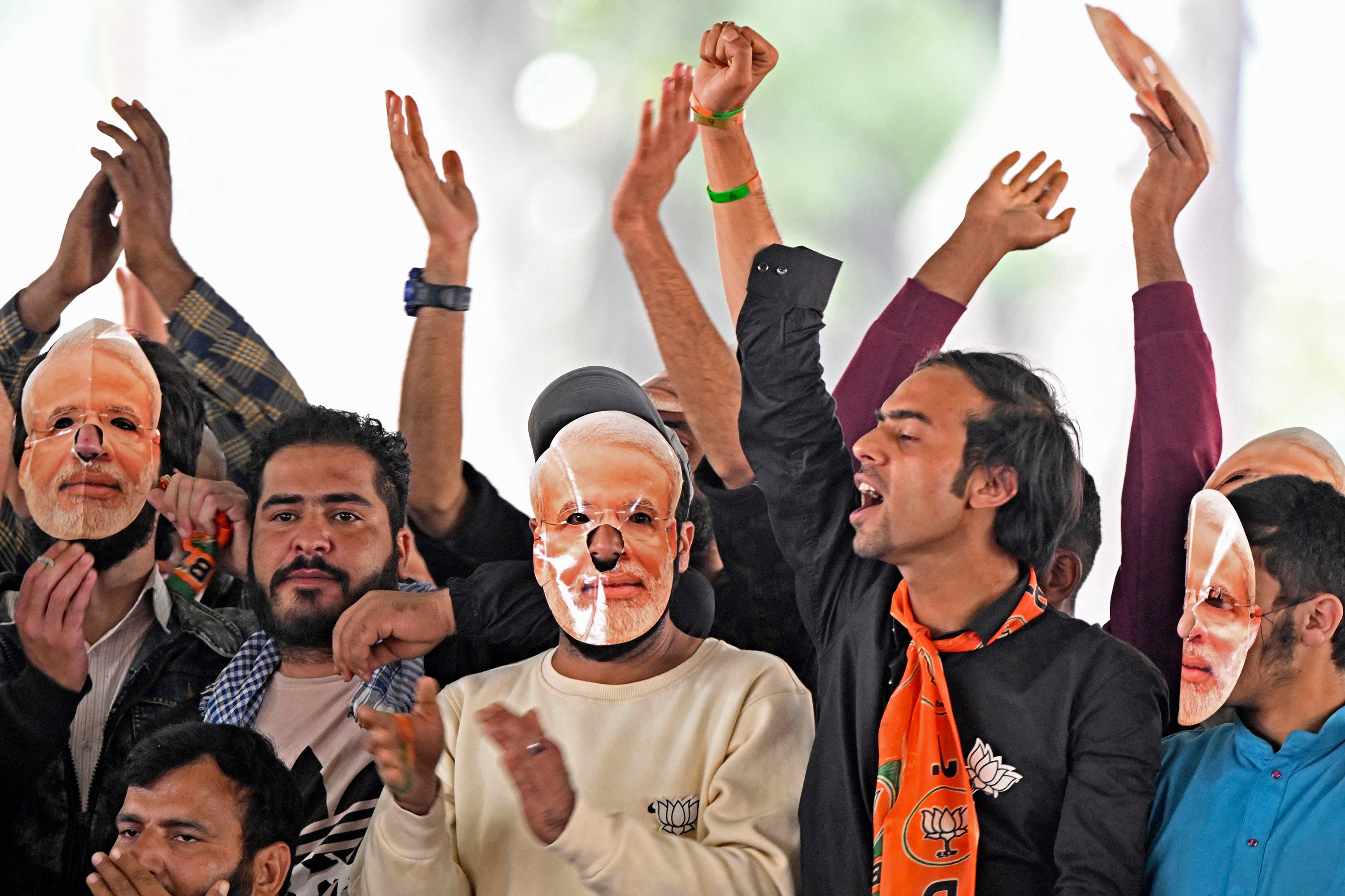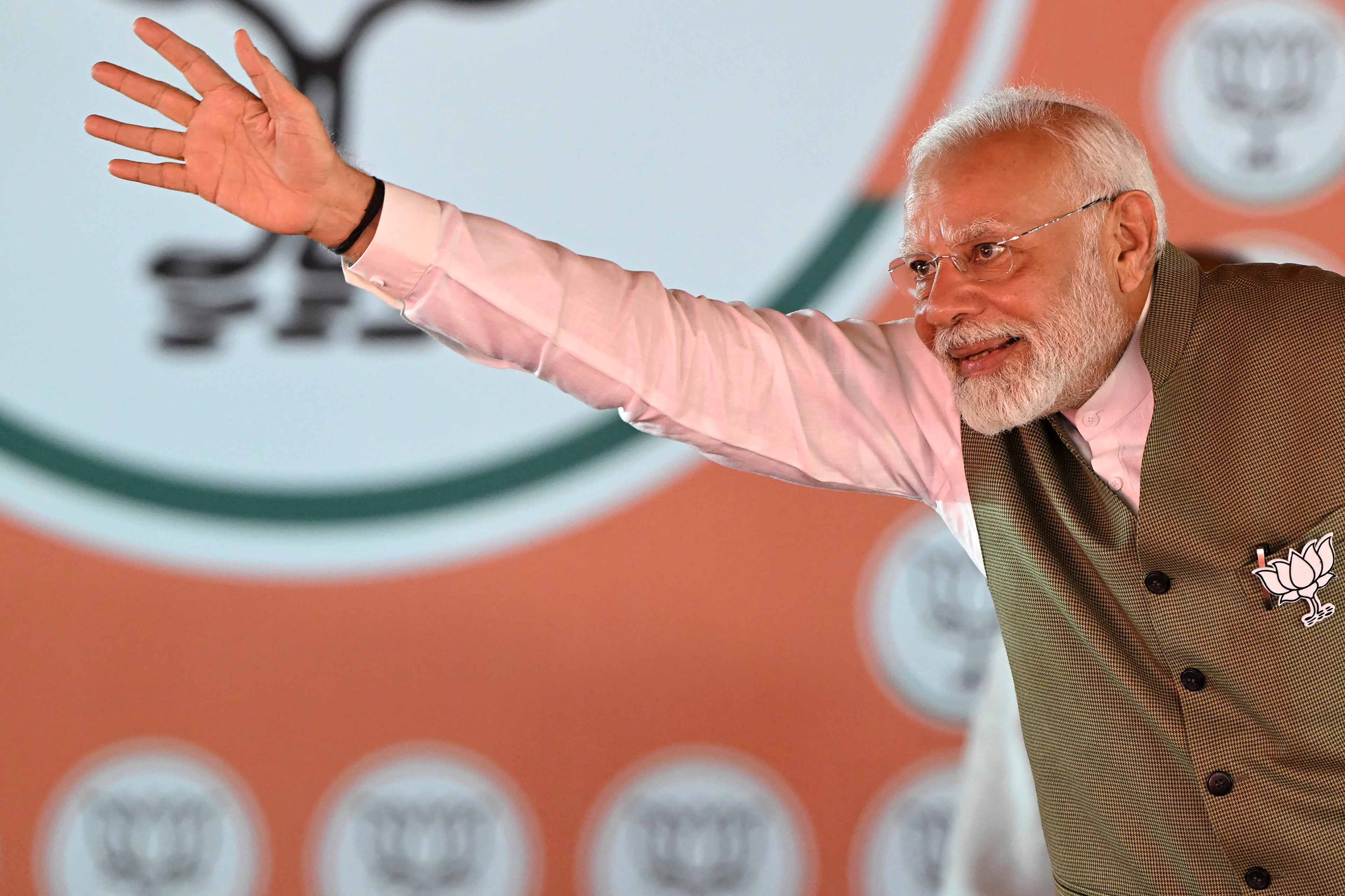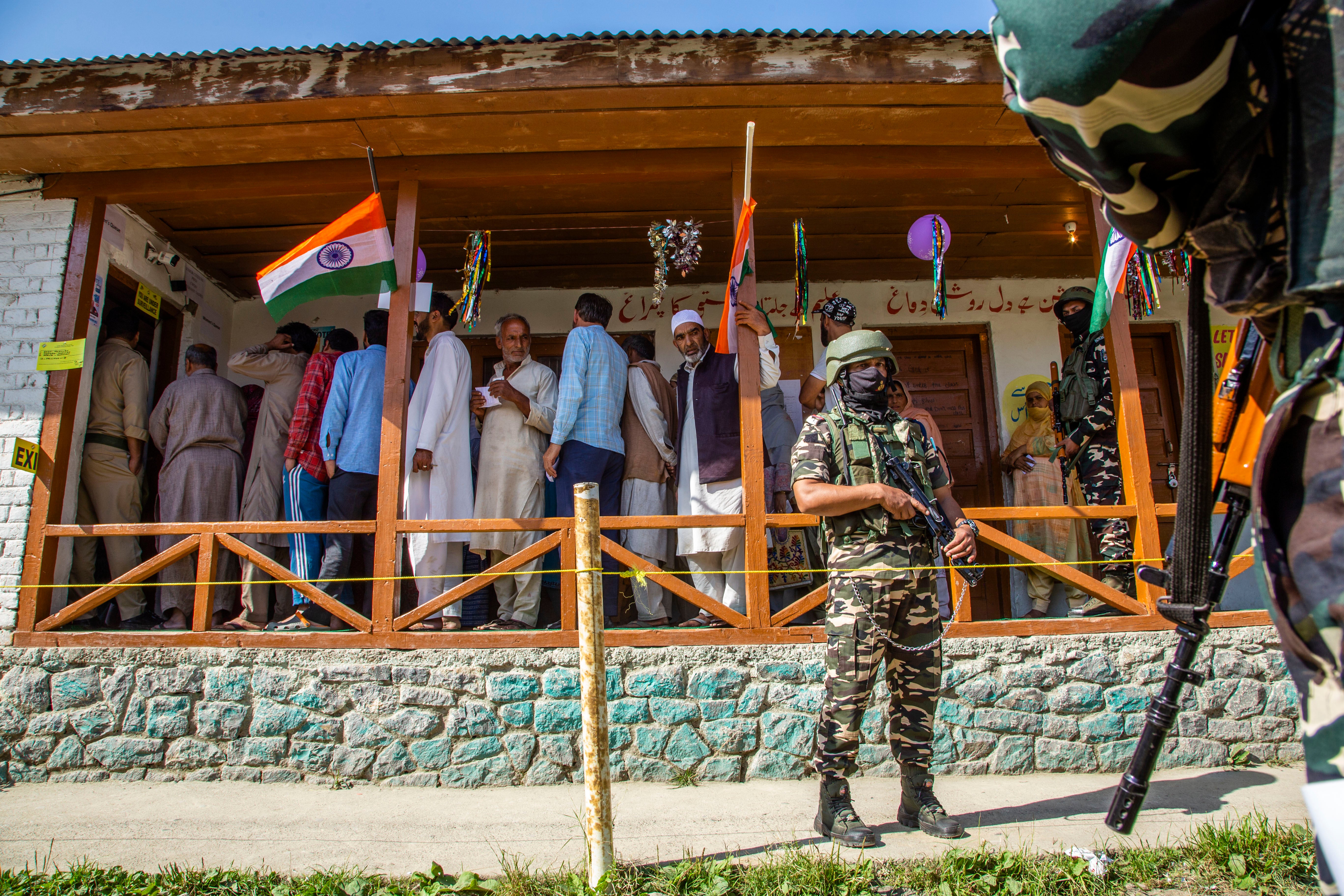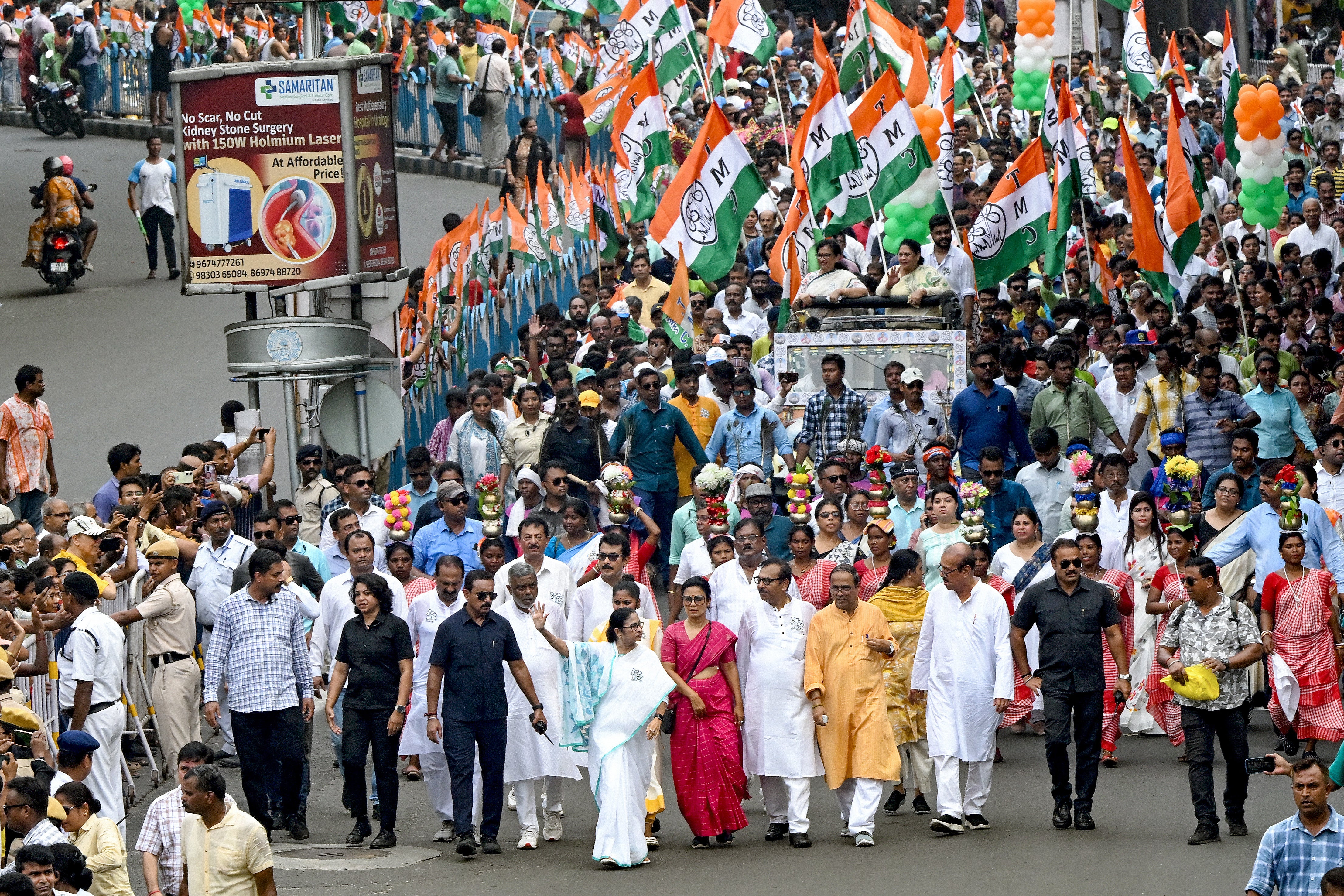‘One nation, one election’: Why Modi is trying to change the way India votes
India's governing BJP says it is pushing ahead with a plan to tear up the schedule of state elections and make everyone vote at the same time once every five years. Opponents tell Namita Singh the measure could have wide-reaching impacts on the nature of Indian democracy


Your support helps us to tell the story
From reproductive rights to climate change to Big Tech, The Independent is on the ground when the story is developing. Whether it's investigating the financials of Elon Musk's pro-Trump PAC or producing our latest documentary, 'The A Word', which shines a light on the American women fighting for reproductive rights, we know how important it is to parse out the facts from the messaging.
At such a critical moment in US history, we need reporters on the ground. Your donation allows us to keep sending journalists to speak to both sides of the story.
The Independent is trusted by Americans across the entire political spectrum. And unlike many other quality news outlets, we choose not to lock Americans out of our reporting and analysis with paywalls. We believe quality journalism should be available to everyone, paid for by those who can afford it.
Your support makes all the difference.India’s government is pushing ahead with contentious plans to fundamentally alter the way the country votes by holding simultaneous elections to state assemblies and national parliament.
Narendra Modi’s cabinet says it plans to proceed with the so-called “One Nation, One Election” proposal, which would end the system of staggered state and general elections and require all votes, including for municipalities and village councils, to take place within a 100-day period once every five years.
The idea has long been a manifesto item for Modi’s ruling BJP, and on his Independence Day speech on 15 August this year the prime minister once again touted the proposal, saying non-stop elections were slowing down the country’s economic development.
But opposition politicians have raised concerns about what they describe as a trend of the Modi years – “centralising” power away from the states, plenty of which are not ruled by the BJP, and into the hands of the federal government and the Prime Minister’s Office.
Critics also question whether there is an existing problem with staggering state elections, and the opposition Congress party says it doubts whether any real savings would be made by changing the system. Some suggest it represents a stunt to rejuvenate Modi’s support base after a weak performance in June’s general election, where the ruling BJP lost its outright majority.
Compiled by a committee led by former president Ram Nath Kovind and featuring top Modi aides including home minister Amit Shah, a 18,626-page report on One Nation, One Election was “accepted” by the Cabinet this week. It came after what the government described as an extensive, 191-day consultation process involving stakeholders and experts, which began on 2 September 2023.

A bill on the proposal is expected to be tabled in the winter session of parliament and aims to streamline the electoral process, reduce the frequency of elections, and "optimise scarce resources", the panel said.
The panel argued that this proposal will bring stability and convenience to voters, while also reducing the financial burden of conducting multiple elections as it will "avoid disruption of supply chains and production cycles due to migrant workers seeking leave of absence to cast their votes". Modi unsurprisingly welcomed the proposal, saying it would make India’s democracy "even more vibrant and participative”.
The change would be implemented by the president of the country issuing a notification on the same day as the first sitting of a newly constituted Lok Sabha (lower house of parliament), triggering the transition process. This date would be known as the "appointed date".
Under the proposed amendments, all state assemblies formed after this appointed date would be dissolved at the end of the Lok Sabha’s full term, regardless of whether they had completed their five-year term or not. This move aims to align the election cycles of the national and state governments.
The BJP-led ruling National Democratic Alliance (NDA) faces significant hurdles as the implementation hinges on securing a two-thirds majority in parliament, necessitating amendments to the constitution.Though it has a simple majority in both Houses, the ruling alliance falls short of the required two-thirds mark by 52 votes in the upper house or Rajya Sabha and 72 in the Lok Sabha. Additionally, ratification from all states and federal territories is mandatory.
Given the BJP’s lack of majority in the Lok Sabha, they’ll need to collaborate with not just their coalition partners from the National Democratic Alliance but also opposition parties to push this through. The Janata Dal (United), a key NDA constituent, has already welcomed the cabinet’s decision.
But the proposal so far has faced stiff opposition, including from the main opposition Congress party. Mallikarjun Kharge, the chief of Congress, has strongly criticised the plan, labeling it "not pragmatic and practical". He called it a mere distraction, and an attempt to divert the public’s attention from more pressing issues. Kharge said he was confident the proposal wouldn’t succeed as "the people will not accept it".
Other opposition parties have also expressed strong reservations. In March, the Dravida Munnetra Kazhagam (DMK) party from Tamil Nadu pledged to scrap the proposal if the opposition INDIA alliance wins the election. Similarly, Mamata Banerjee, the leader of Trinamool Congress and chief minister of West Bengal, condemned the proposal, calling it an attempt to undermine India’s constitutional framework and promote autocracy under the guise of democracy.
The Independent has reached out to the BJP for comment.
Michael Kugelman, the director of the South Asia Institute at the Wilson Center, argues that the “main motivation” behind the panel’s proposal is “financial”.
“The idea is that by holding fewer elections, you incur fewer costs,” he told The Independent. “Elections are not cheap in India with such a large voter base. So the more elections you have, the more you need to spend money on security, poll workers. So, I think there is whole pragmatic motivation.”
Simultaneous elections aren’t a new concept in India, which held votes in this manner from 1951 to 1967. The peak was reached in 1967, when elections in 20 states coincided with the national elections for the lower house of parliament. This synchronised election trend continued in subsequent years, albeit with fewer states participating. For instance, in 1977, 17 states held simultaneous elections, while in 1980 and 1985, the number dropped to 14 states.

The polling schedule started to become more dispersed due to various factors, one of the main reasons being mid-term elections. Other factors that may have contributed to this dispersal included resignations or deaths of incumbents, and election irregularities leading to repolls.
The nine-member government panel also said it found that real GDP growth was higher when simultaneous polls were held, compared to a decrease when they were not.
Kugelman suggests that with the syncronisation of elections, the process is likely to become more “efficient”. “The idea of the proposal is that it becomes more predictable and easy. Given the risk of electoral violence and violence around elections, the idea is, if you do them in a way that they are happening less frequently, and on a more orderly basis, there is simply going to be a lower risk,” he said.
Professor Apoorvanand Jha argues that the proposal threatens India’s federal structure by promoting a unitary concept of the country. “The spirit of federalism is diversity and diversity in all matters and matters of time, being, composition, in matter of nature of state and the tendency of Modi is to centralise everything,” he says.
Jha says the Rashtriya Swayamsevak Sangh (RSS), the ideological parent of the right wing Hindu nationalist BJP, views India as a “unitary country” where states would ideally disappear or be heavily monitored by the central government. This is already happening, he claims, with “governors acting as agents of the union, resembling viceroys rather than representatives of state interests”.
Explaining the impact of simultaneous elections on India’s federal structure, Saral Patel, a member of the publicity committee of the Congress, says the change would likely reduce the focus during election campaigns on local issues compared to the national agenda.
“It poses a long term risk by concentrating power in the centre,” he says. “Because currently each and every state is governed by their whole election schedule and are held accountable in their own right. Whereas if it is combined with the union elections, the larger political compulsions will take precedence over the local issues.”
When Modi won the general election for the first time in 2014, he explains “there was this euphoria, that Modi is invincible, Modi is god and that continued until 2024 [in the general election]”.
However, less than a year later, in 2015 Arvind Kejriwal of Aam Aadmi Party swept 67 of the 70 seats in Delhi, while BJP managed only three assembly seats. “That put the fear of elections into Mr Modi’s heart,” he says. “If national elections were happening together, this sentiment would have been overtaken by the love for Mr Modi,” he says.
He says having state assembly and national elections at different times allows the electorate to hold government accountable based on “different level of governance”.
“And that, that sort of grounds any politician in taking pro-people decision,” Patel says. “And no level should overtake or precede the accountability of the other level. In One Nation, One Election- kind of a scenario, this sentiment would not be there.”

The timing of the proposal in Modi’s third term, rather than his first or second, is a strategic move, says Jha.
He believes Modi’s approach was to periodically create shock and momentum by bringing “forward something which is then touted as a big [and] transformative idea”. This tactic, he says, helps him maintain momentum and prevents exhaustion of all initiatives at once.
He cites examples like the overnight demonetisation of high currency Indian notes, the building of the controversial Ram Temple, and the removal of Jammu and Kashmir’s semi-autonomous status as previous instances of this strategy.
Jha also questions the panel’s claim that elections cause disruption to supply chains and production cycles, as migrant workers seek “leave of absence to cast their votes”.
“Everything keeps running, offices are open, factories are open, nothing is closed,” he says, adding that “farmers are not involved in the election campaign. During the election campaign, there’s only the prime minister who doesn’t work. He keeps touring and campaigning. That is all he does. But others keep working.”
Join our commenting forum
Join thought-provoking conversations, follow other Independent readers and see their replies
Comments